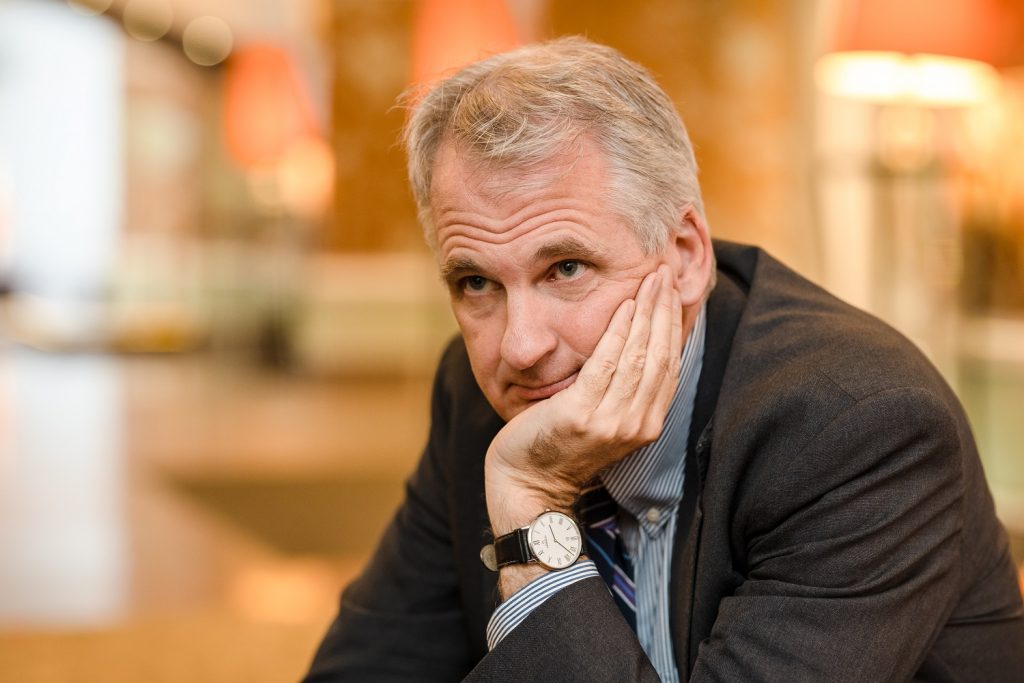Estonian World interviewed Timothy Snyder, a renowned American academic, historian and an author of many globally influential books, such as “Bloodlands. Europe between Hitler and Stalin”, “Black Earth: The Holocaust as History and Warning”, “On Tyranny. Twenty Lessons from the Twentieth Century” and “The Road to Unfreedom: Russia, Europe, America”.
The Mauerfall 30 Conference, dedicated to the 30th anniversary of the fall of the Berlin Wall, took place at the beginning of November in Tallinn. The conference touched upon many topics during panel discussions and one of the participants and panellists was Timothy Snyder, a well-known historian, author and academic specialising in the history of Central and Eastern Europe, and the Holocaust. Currently, he is a professor of history at Yale University and a permanent fellow at the Institute of Human Sciences in Vienna.
Snyder’s works have been published in forty languages and include “Black Earth”, “The Road to Unfreedom”, “Bloodlands. Europe between Hitler and Stalin” and “On Tyranny. Twenty Lessons from the Twentieth Century”. Estonian World sat down with Snyder to discuss his works, his views on the latest developments in Europe and America and the importance of historical memory and commemoration.
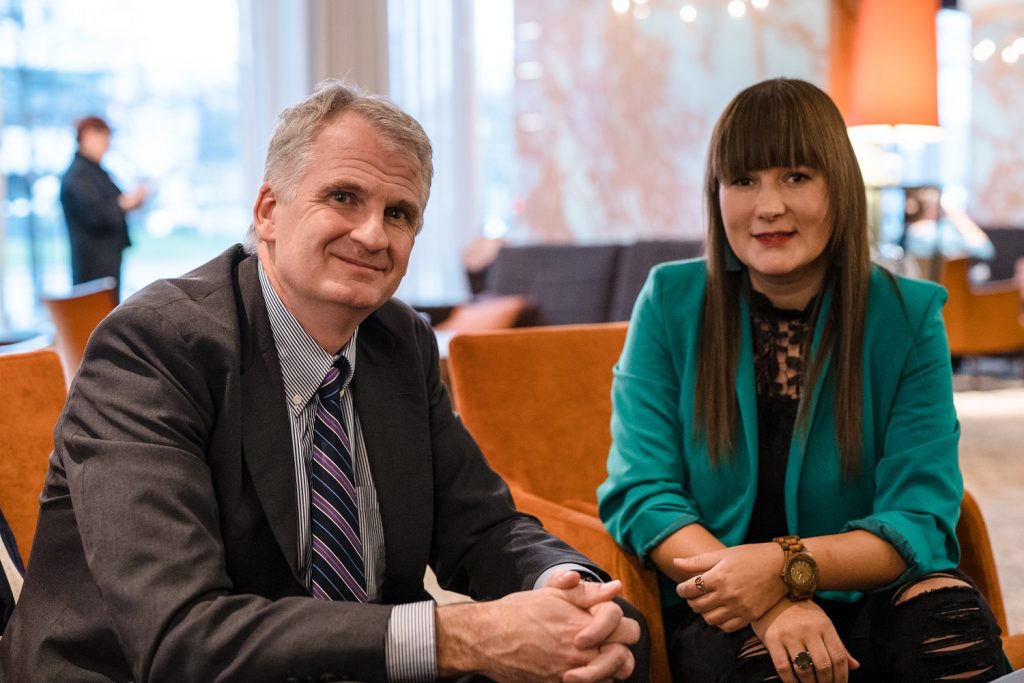
Your book “On Tyranny. Twenty Lessons from the Twentieth Century” was published in 2017, shortly after Donald Trump came to power. You have mentioned you started the book on a plane and finished it very quickly. Afterwards, the book became known all around the world very fast and has resonated with the current events in Estonia as well. I found the chapter on cybersecurity very useful – where you advise taking care of one’s internet presence, and definitely the part about being kind and talking to people more – something that we need in every community at the moment. We are now in 2019 – if you could add another chapter or suggestion, now that a few years have passed, would you include anything else?
The reason I wrote “On Tyranny” was that I was trying to make sure that people took action. When surprising things happen, especially surprising undesirable things, the tendency of people in general – and Americans in particular – is to say, “nothing has really happened” or “our institutions will protect us” and “everything will be fine”. I wrote this book to remind everyone that institutions only protect you if you protect them and that everything will not be fine unless you do something about it. So the career of “On Tyranny” has been that it started in America, but interestingly then went all around the world and people found that it was generally useful.
My answer would be that I wouldn’t change anything since it seems to reach people, so I think the me who, in 2016, was very upset and wanted to write a very short message, was doing the right thing and I would not want to change anything. One of the chapters is about language where I am saying “to be kind to the language” – I might write a little bit more there about the internet and issues like that, but that’s all I can really think of.
Part of the American media has called you a “black prophet” and an “unofficial prophet of totalitarianism”. One article called your works “relentless hammering at Trump’s connection to Russia and the dangers Putin poses” – the latter is something that Estonia and most of the post-Soviet countries have been warning the West about for a while already. They were not taken seriously at least until the attacks on Crimea and a meddling in the last US presidential election. Estonians were horrified by Russia’s invasion of Georgia back in 2008 and there were many protest actions already then, so the general opinion is that there is nothing exaggerated about your views and theories. What would you like to say to most of your critics on these matters? How grave is the situation on both sides of the Atlantic now?
It is very easy, especially if you are an American, to say that we are separate from the rest of the world, and that the rest of the world doesn’t really matter. That’s American exceptionalism which figures that both the American right and the American left is what you are now sighting so we’re sure everything is okay, and we are also sure nothing that has happened at the rest of the world matters. I have nothing to say about that, it is vacuous and uninteresting, and it has been proven wrong.
I try to say what I have to say, rather than engaging in arguments. There have been plenty of people who reached out and said “no, there was no Russian intervention in the US elections”. There is no point arguing with that, they will either figure it out or they won’t. What I was consciously doing in “The Road to Unfreedom”, was to lay out all the evidence from the Russian and the Ukrainian and the other European sources, so that there would be a kind of landmark. So if Americans wanted to – in 2017 or later – they could read this and follow these sources back. This is what I was doing very consciously.
Where I am coming from is where you are coming from. My intuitions about this come from Eastern Europe and of course my sources come from Eastern Europe. The things that I noticed in United States, I noticed because I had noticed them already in Russia or Ukraine. That was the advantage that I had. Not just me of course, there are other people like Peter Pomerantsev and Anne Applebaum who said similar things at the same time.
The advantage was that I wasn’t looking at America from America, I was looking at America as part of an international history which was unfolding. And I think that’s good. I think America should look at other countries to learn from their examples and to figure out what they should actually fear. America has become a very provincial country where everyone is sure that only thing that matter are their enemies inside the country, which is not true.
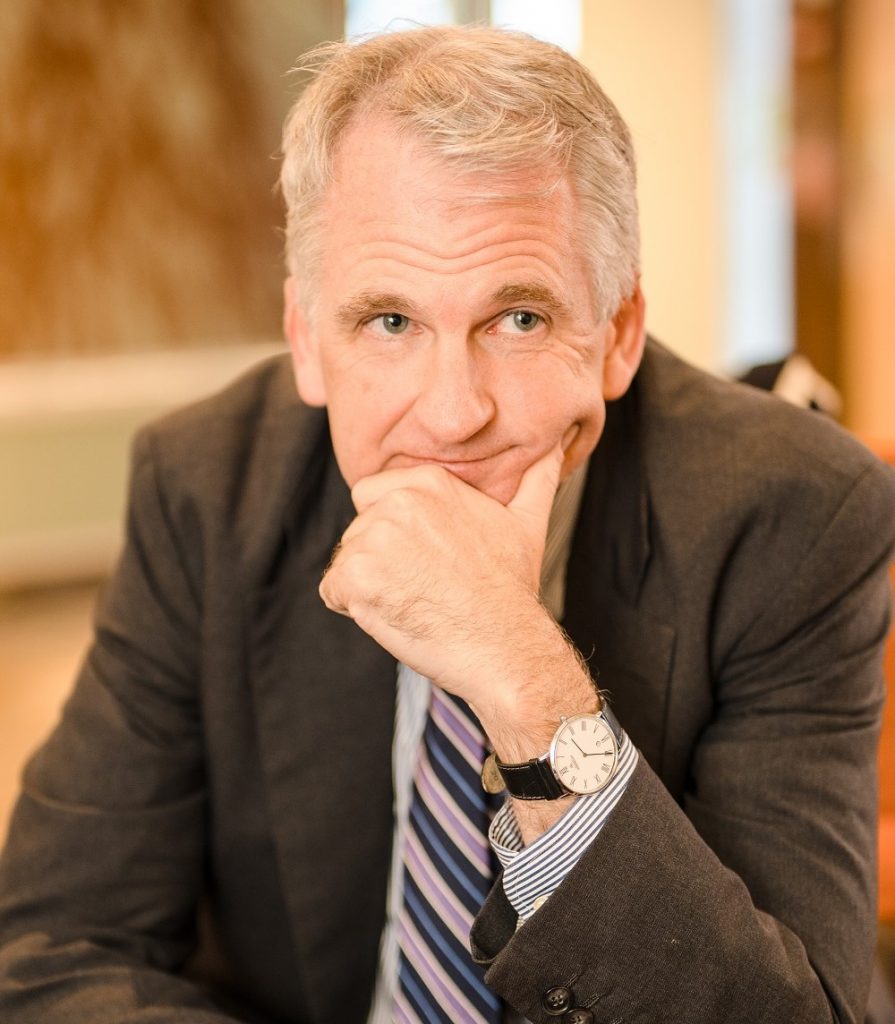
Edward Lucas, a renowned British journalist and writer, claimed in one of his articles in March this year that “ex-communist Europe shouldn’t worry us” and that troublemakers of Europe can be found in the West and South, not in the East anymore. He argues that even 30 years after the collapse of communism, the West is still using lazy stereotypes, thinking that everything once east of the Iron Curtain is still left behind, eccentric and causing trouble. With a few exceptions maybe, the Middle and Eastern Europe countries very much enjoy liberty, freedom, dignity and openness that we have fought for since 1989 and before. The East has been trying to copy the Western ways and has also experienced enough setbacks on the way, it has not all been just smooth sailing. For some reason, there is still constant talk about the “transitional societies” in the world media. How long will the Eastern European countries be transitional and where are they actually going, and what are still the differences between Western and Eastern Europe in your opinion?
First of all, there is no such thing as a transition. Transition implies that you know how things will end and any good historian can tell you that you never know how things are going to end. That is an empty concept and it is a misleading one.
My second point is that this idea that there was a “Western world” and that the Eastern European countries just had to become like the West was itself problematic from the beginning. The Western countries themselves, too, have all kinds of different histories and democracies. There was no actual “Western model” – that might have been an model for a few months or maybe even a few years, but it is damaging in the end, because it makes you think that all you have to do is replicate something that already exists and then we’re done. But freedom cannot be about that. Freedom cannot be about some model or some system that you can imitate. Freedom, whether it is personal freedom or national freedom, in the end, has to be about the future and about unpredictability and about finding your own way at every level.
So that whole idea that there is a transition and that there is a model for Eastern Europe is the real problem. Now we see it in reverse where the West would want to say “everything is fine with us; it is just the Eastern Europeans” – this is clearly not true. The two biggest troublemakers in the transatlantic system are Putin and Trump, in that order. And whatever you would like to say about Trump, he is not Eastern European. He is a barbarian, maybe, but he is not Eastern European.
I agree with Edward Lucas – it makes more sense for us to look at general problems which tend to be the same everywhere and simply show up in slightly different proportions. Wealth and inequality especially as related to hydrocarbons (an organic compound consisting entirely of hydrogen and carbon – editor). The general problems are the digitalisation of politics and the related polarisation, the attacks on factuality – these things are everywhere, they might appear in different forms, but they’re everywhere which makes me think that solutions will also have to be general solutions.
Unlike many other formerly Soviet-occupied countries, Estonia miraculously regained independence in 1991 without any victims. In his speech at this conference, former Estonian president, Toomas Hendrik Ilves, also suggested a non-violent approach to the radical issues we are facing lately. His advice was to keep calm and simply keep laughing at the populists, their propaganda and their silly rhetoric. What would be other non-violent solutions to fight the rise of populism and right radicals everywhere in Europe that would also not include constant antagonism, opposition and conflict? Especially in a small country like Estonia, it is a threat to start opposing people to each other constantly. Also, the topics of deprivation and distinctions between “first and second” Estonia are present here, too – the Estonian social anthropologist, Aet Annist, researched the topic of deprivation already in the beginning of the millennium. What would be your advice for Estonia to keep this from happening? How to tackle this elusive “hatred against the elite”? How can we keep the boat steady and stay on the course of democracy and open values?
I would not go into details about the particularities of Estonia, but I think there are a few general things. You have to keep the idea of the future in politics, both in language, but also as a reality. People grow frustrated because they do not see how their life is getting better, their children will live a harder life than they have. And although they might not be poor, they might be living completely reasonably, but that feeling of being “stuck in place” is very frustrating, very irritating. And the only way to deal with this is to actually have ideas about the future and policies that can help people move into that future.
My second point is that we should not fall into politics that are only about “us and them”. The right-wing wins by turning politics into basically a language game where each side agrees to be a side, and everybody agrees that politics is about calling other people names. So they call you “the elite” and you call them stupid and they are happy because that is all they want – they want politics to be about languages, because they are better at it than you are. The fact that they do not have any plans for the future, won’t matter, because everyone is just engaging in these language games.
Thirdly, it is very important to recognise what the voters of right radicals might be correct about. You don’t like racism and homophobia and I don’t like these things either, but we cannot say that everybody who voted for radicals is wrong about everything. There are things that their voters are right about, and you have to figure out what those things are rather than dismissing their voters entirely. As soon as you dismiss their voters entirely, there are two sides – the right side and the wrong side. You are playing their game and they win.
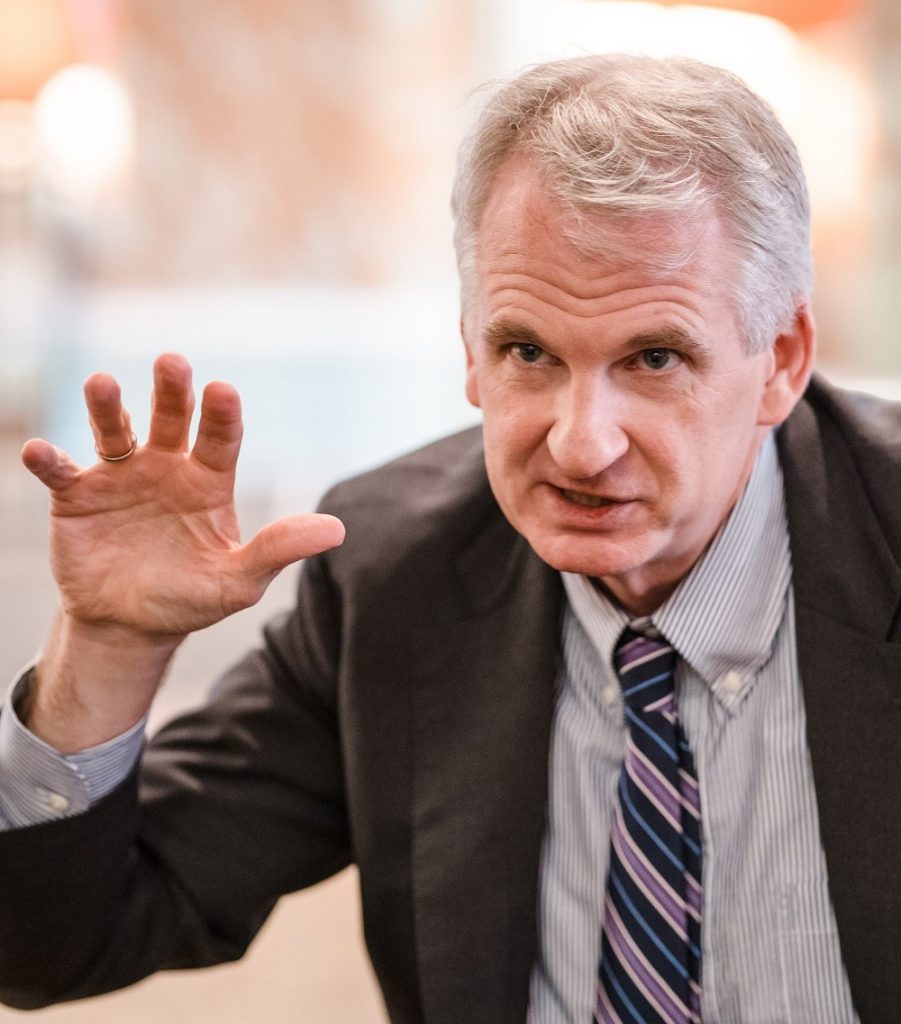
Another difficult question in Eastern Europe is still about equalising the crimes of Nazism and Communism. The Western view always seems to condemn and emphasise the crimes of the Nazi regime more than these of the communists, which has resulted for example in the “Prague Declaration on European Conscience and Communism”, signed in 2008, that calls for Europe-wide condemnation of, and education about the crimes of communism. Do you feel that it is justified and what would be the best way to approach this so that everyone would feel included?
I am generally sympathetic with East Europeans who believe that their history has not been understood. During the Cold War, the West developed a very coherent idea of the pattern of European history, a pattern that basically includes Greece, Rome, the Renaissance, the French Revolution, the industrial revolution, the European integration to NATO. This is the pattern in the past that people lived in for a couple of generations and which works entirely without Eastern Europe.
So it is hard for Eastern Europeans to “get back in” to the history of Europe of the West, not just because of the ideas of communism or national socialism, it goes much deeper than that. I think the only remedy would be a history of Europe in which themes – because communism and Nazism are themes – are understood broadly, because the theme is applied to everyone.
Communism is thought of differently in France than in Ukraine and it is thought of differently in Portugal than in Finland for a reason. The Nazi past is different for the Germans than it is for the Dutch also for a reason.
I think the thing to do is to have a European history. For me, the tragedy is that there is this thing called the European Union, and there are lots of good schools inside Europe, but there is no single work that every European student reads. There is no single curriculum where you have themes and one of these themes is communism. I think every kid in Portugal should know that there was famine in Ukraine in 1933 and I think every kid in Estonia should know that there was famine in Ireland in the middle of 19th century.
These are basic things that everyone should know and if they were de-nationalised, that would remove a lot of that approach where the Germans think that they have already figured everything out and so they want to tell you how they have learned from the past, and the East Europeans who then say “no, we’re small and no one has ever listened to us and you are not listening to us now and you’re being imperial”. I think you can get out of that if the history is treated more systematically. This is what I tried to do in “Bloodlands” – which, although it is about nations, it starts from people and the experience of individuals.
I think the situation has not gotten better; it has just changed. The major change in the last five years is probably the rehabilitation of national socialism, so it is not true anymore that everyone in the West says that Holocaust was the only thing that matters. There are plenty of people in the West now who say that the Holocaust doesn’t really matter and if it did happen, it wasn’t such a bad thing. The return of basically Nazi conspiratorial thinking is a major issue in the West.
This goes back to your first question – this whole idea that the antisemitic source is behind everything is happening in the East and the West at the same time. The Trump administration does it just like Orbán does it, plenty of other people do it. For me, sadly, this is the main thing which has changed. There is no real consensus anymore in the West against Hitler.
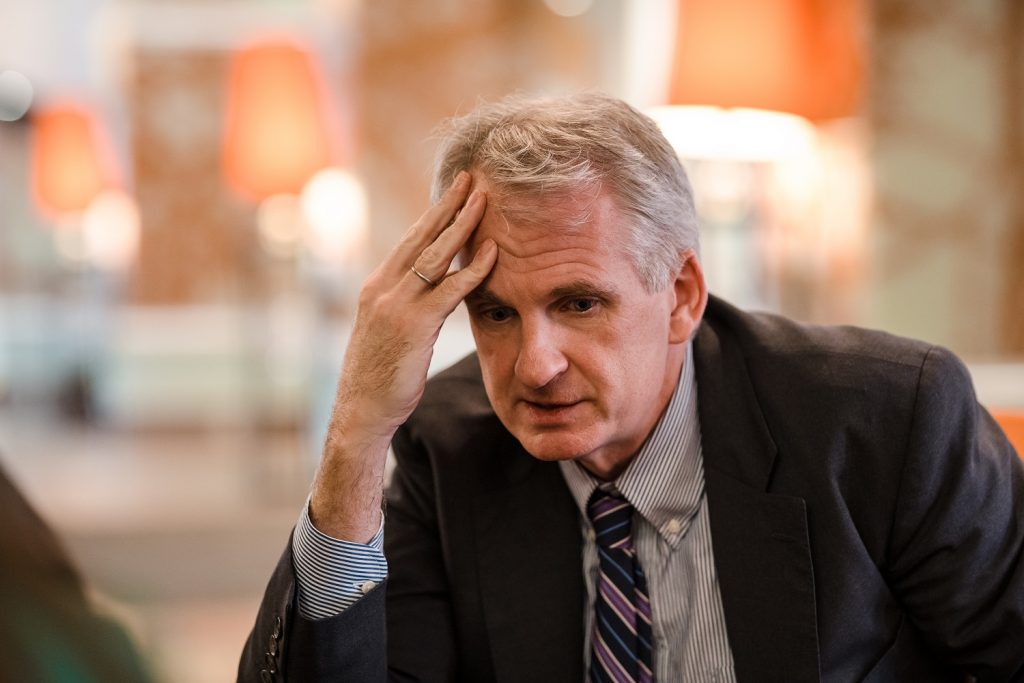
The 21st century revolutions seem to be about two things – climate and technology. You have always, in your works, emphasised the role of an individual and his decisions, making your own research and basing your decisions on that. Yet, so many people do not feel like their decisions and choices matter. How can an individual’s considerate consumption and recycling habits even compete with the waste that large corporations create? How can we be careful and considerate on social media when we cannot compete with all the trolls and fake information out there? How could we empower the 21st century individualism more and make people realise they have a choice, a decision and power?
You do these things because that’s the kind of person you want to be and that’s they have some effect on other people, but they are never enough on their own. East European dissidents in the 1970s talking about speaking the truth were aware that just speaking the truth will not overturn the communist system. Just like being civil on the internet, you know it will not overturn Facebook, other things have to happen.
The individual thing is morally very important, it is important as an example, but it is also very important people for young people who want to change the world to take the state seriously. You simply cannot deal with either the digital world or with climate without the state.
There is no way that groups of young concerned anarchists are going to handle Silicon Valley or climate change – the state has to be brought back into it and you will notice that people who are making lots of money either on hydrocarbons or by way of digital stock, they tend to say “oh, the state doesn’t matter”. They want you to think the state doesn’t really matter. They want you to fight them without the state, because they know that’s when they will win.
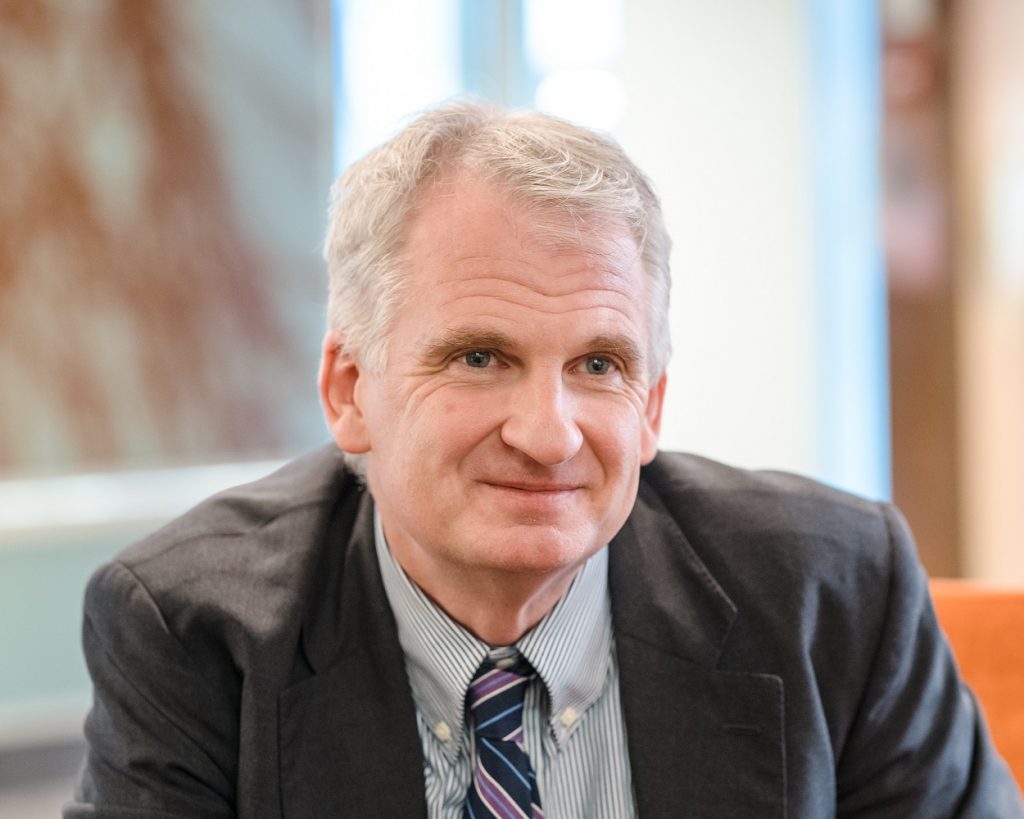
Coming back to the topic of this conference, commemorating the fall of the Berlin Wall. There are a lot of historical milestones and memorial days especially in 2019 – 30 years since the fall of the Berlin Wall, 30 years since the Baltic Way for Estonians, but there are a lot of other commemorations about the Holocaust and Soviet mass deportations in Eastern Europe as well. Do you think commemorating these events helps the modern people connect to the past or keeps them stuck on the negative as many also think? What should be the role of commemoration nowadays and what would be the best way to honour and celebrate grave and negative events of history?
I think the turn has to be made and some people are making it. The turn that has to be made is from memory to history and then from history to thinking about the ethics and politics of grave situations. Of course, these things have to be remembered. For example, the Museum of Occupations and Freedom in Tallinn is very good about this. If it is Estonia 1990 or Ukraine 1990, there are very strong reasons to try to remember and write everything down.
In the long run, for your own sake, the commemoration has to be a reflection on how you behave in politics or how you behave in society, on an everyday level. Because after a while, the question is not “what happened?”, it is “what is happening?” or “what can happen?”. I think commemoration is very important, but as the memory of people who experienced these scenes, becomes history, the history has to become language that people can use to reflect on the things that they are doing.
Cover: Timothy Snyder. Photos by Marko Poolamets, courtesy of the Open Estonia Foundation.

